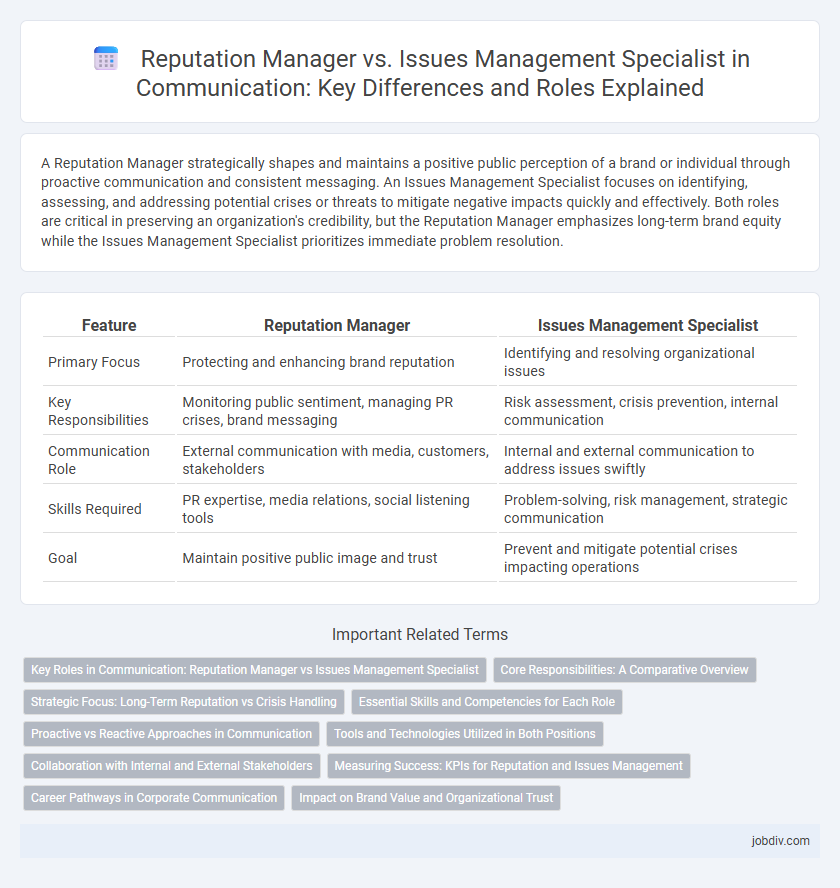A Reputation Manager strategically shapes and maintains a positive public perception of a brand or individual through proactive communication and consistent messaging. An Issues Management Specialist focuses on identifying, assessing, and addressing potential crises or threats to mitigate negative impacts quickly and effectively. Both roles are critical in preserving an organization's credibility, but the Reputation Manager emphasizes long-term brand equity while the Issues Management Specialist prioritizes immediate problem resolution.
Table of Comparison
| Feature | Reputation Manager | Issues Management Specialist |
|---|---|---|
| Primary Focus | Protecting and enhancing brand reputation | Identifying and resolving organizational issues |
| Key Responsibilities | Monitoring public sentiment, managing PR crises, brand messaging | Risk assessment, crisis prevention, internal communication |
| Communication Role | External communication with media, customers, stakeholders | Internal and external communication to address issues swiftly |
| Skills Required | PR expertise, media relations, social listening tools | Problem-solving, risk management, strategic communication |
| Goal | Maintain positive public image and trust | Prevent and mitigate potential crises impacting operations |
Key Roles in Communication: Reputation Manager vs Issues Management Specialist
A Reputation Manager oversees brand perception by implementing strategic communication plans to build and maintain positive public image, often using media monitoring and stakeholder engagement techniques. An Issues Management Specialist focuses on identifying, analyzing, and mitigating potential crises or emerging issues that could harm the organization's reputation, employing risk assessment and crisis communication strategies. Both roles require strong communication skills but differ in proactive brand building versus reactive problem resolution within corporate communication frameworks.
Core Responsibilities: A Comparative Overview
Reputation Managers concentrate on monitoring brand perception, crafting communication strategies, and maintaining positive public image by managing social media, press releases, and stakeholder engagement. Issues Management Specialists focus on identifying, analyzing, and mitigating potential crises or risks that could negatively impact an organization's reputation or operations through proactive planning and rapid response. Both roles require expertise in media relations and strategic communication but differ in scope, with Reputation Managers emphasizing ongoing brand integrity and Issues Specialists prioritizing crisis prevention and resolution.
Strategic Focus: Long-Term Reputation vs Crisis Handling
Reputation Managers concentrate on building and maintaining a positive brand image through long-term strategic planning and proactive reputation enhancement tactics. Issues Management Specialists focus on quickly identifying, addressing, and mitigating immediate crises to minimize damage and restore stability. The strategic focus for Reputation Managers is sustained reputation growth, while Issues Management Specialists prioritize rapid crisis response and resolution.
Essential Skills and Competencies for Each Role
Reputation Managers excel in brand monitoring, strategic communication, and crisis response to maintain and enhance public perception. Issues Management Specialists specialize in risk assessment, stakeholder engagement, and proactive problem-solving to address potential threats before they escalate. Both roles demand strong analytical thinking, media relations expertise, and adaptability, but Reputation Managers prioritize brand image cultivation while Issues Management Specialists focus on early detection and mitigation of organizational challenges.
Proactive vs Reactive Approaches in Communication
Reputation Managers employ proactive communication strategies to build and maintain a positive brand image by anticipating potential issues and engaging audiences before problems arise. Issues Management Specialists focus on reactive communication, swiftly addressing and mitigating crises as they occur to minimize damage and restore trust. The proactive approach emphasizes long-term reputation growth, while the reactive approach prioritizes immediate problem resolution and damage control.
Tools and Technologies Utilized in Both Positions
Reputation Managers leverage advanced social media monitoring platforms, sentiment analysis tools, and customer relationship management (CRM) software to track brand perception and proactively shape public opinion. Issues Management Specialists utilize crisis communication tools, real-time alert systems, and collaborative project management software to identify, assess, and resolve emerging risks efficiently. Both roles integrate data analytics and artificial intelligence-driven insights to optimize decision-making and response strategies.
Collaboration with Internal and External Stakeholders
Reputation Managers coordinate closely with marketing teams, executives, and media outlets to ensure a consistent brand narrative and protect corporate image. Issues Management Specialists engage proactively with regulatory bodies, community leaders, and crisis communication teams to address emerging risks and mitigate potential reputational damage. Both roles require seamless collaboration with internal departments and external partners to align strategies and respond swiftly to public concerns.
Measuring Success: KPIs for Reputation and Issues Management
Reputation Managers measure success through KPIs such as brand sentiment scores, media impressions, and social media engagement rates to gauge public perception and influence. Issues Management Specialists focus on KPIs like response time to crises, resolution rates, and stakeholder satisfaction to evaluate effectiveness in mitigating risks and resolving challenges. Both roles rely on data-driven insights to optimize communication strategies and protect organizational reputation.
Career Pathways in Corporate Communication
Reputation Managers specialize in shaping and maintaining a company's public image through strategic messaging and media relations, often progressing to senior public relations or corporate communications leadership roles. Issues Management Specialists focus on identifying, analyzing, and mitigating potential crises or risks that could harm the organization's reputation, typically advancing toward risk management or crisis communication director positions. Both career pathways intersect in corporate communication but emphasize different skillsets: proactive reputation building versus reactive problem-solving and risk mitigation.
Impact on Brand Value and Organizational Trust
A Reputation Manager actively shapes public perception by monitoring brand sentiment and strategically promoting positive narratives, directly enhancing brand value and fostering organizational trust. An Issues Management Specialist prioritizes identifying and mitigating potential crises, minimizing damage to reputation, which protects brand equity and sustains stakeholder confidence. Both roles are crucial for maintaining a resilient brand image and ensuring long-term trust in corporate communications.
Reputation Manager vs Issues Management Specialist Infographic

 jobdiv.com
jobdiv.com